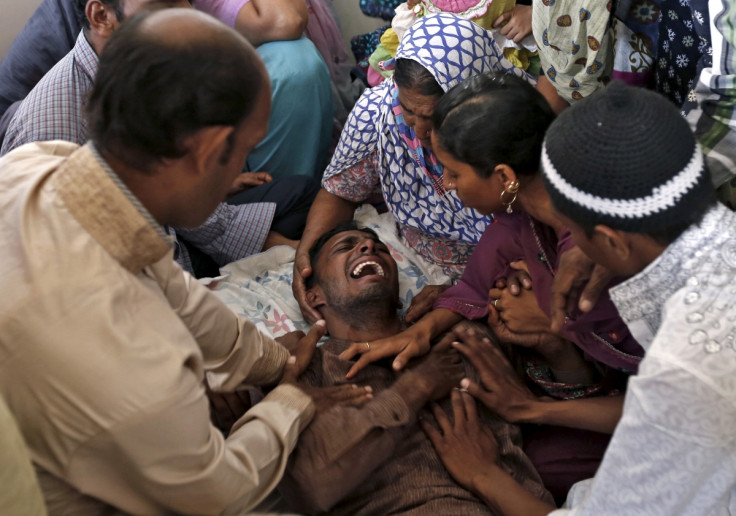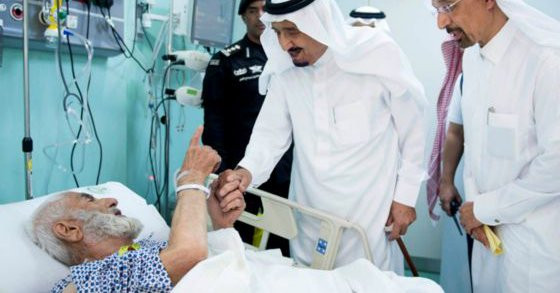Mecca hajj stampede: Road closures for Saudi Arabia King Salman blamed for Eid-al-Adha catastrophe

Saudi Arabia has come under pressure to explain why at least one of the roads leading to Jamarat bridge – the site where the symbolic stoning of the devil takes place at Mina – was apparently closed off by local security before the stampede that killed at least 717 people and wounded 850 more at the annual Muslim hajj.
The Saudi civil defence said two groups of thousands of pilgrims walking towards the three Jamarat pillars collided at the junction of Street 204 and Street 223 because of a sudden increase in the number of people. Saudi King Salman ordered a swift investigation, chaired by Crown Prince Mohammed bin Nayef, into the incident and admitted there was a need "to improve the level of organisation and management of movement" of pilgrims.
The Saudis say after every disaster 'it is God's will'. It is not God's will – it is man's incompetence
The country's health minister blamed the tragedy on pilgrims failing to follow instructions from authorities. "The accident, as most know, was a stampede caused by overcrowding, and also caused by some of the pilgrims not following the movement instructions of the security and Hajj ministry," Khalid al-Falih said, while the interior ministry said high temperatures and fatigue may also have played a role.
However, the head of Iran's Hajj pilgrimage, Said Ohadi, said two paths had been sealed near the site where the stampede occurred for "unknown reasons" and claimed "this caused the tragic incident", according to AP. Iranian officials said at least 131 Iranian pilgrims were among the dead. Ohadi said the path closures left only three routes to the area where the "stoning the devil" ritual takes place.
The apparent victim-blaming was also stigmatised by Mohammed Jafari, an adviser to Hajj and Umrah Travel, the first hajj travel agency in the UK. Speaking on BBC Radio 4's Today programme, he alleged that the roads were closed in occasion of King Salman's meeting with dignitaries from other Gulf countries in his palace in Mina.
"The Saudis say after every disaster 'it is God's will'. It is not God's will – it is man's incompetence," he said. "Talking to pilgrims on the ground yesterday, the main reason for this accident was that the king, in his palace in Mina, was receiving dignitaries and for this reason they closed two entrances to where the stoning happened ... these were the two roads where people were not able to proceed."
"You have a stream of people going in and if you stop that stream, and the population builds up, eventually there is going to be an accident," he continued. "It is the fault of the Saudi government because any time a prince comes along, they close the roads, they don't think about the disaster waiting to happen."
The Saudi press agency reported on 24 September that the King was received by Bin Naif, the deputy minister, minister of interior and chairman of the Supreme Hajj Committee, and by other ministers and senior civilians and military officials.
A Lebanese newspaper, the Arabic-language daily al-Diyar, conjectured that the one-way traffic directions were changed to allow the large convoy of Prince Mohammad bin Salman al-Saud to pass through and reach Mina palace for a meeting with the King, his father.
According to the report, which is not verified, the deputy crown prince and defence minister arrived escorted by 350 security forces including 200 military and 150 policemen. Saudi officials dismissed the report as "incorrect".
Jafari's remarks were echoed by other eyewitnesses who survived the deadly stampede. Yusuf Ibrahim Yakasai, from the BBC's Hausa Service, cited a witness as saying the Saudi security at the scene blocked one of the roads to the Jamarat. "This happened as thousands of pilgrims from different countries like Iran, Cameroon, Ghana and Niger were going to the Jamarat," he said.
"Therefore, as those who finished stoning the devil were coming back on the same route, they met those heading to the place. There was a kind of collision between the two groups moving in opposite directions on the same road. Those in the middle were the most affected."
Another pilgrim from London who was in Mina on 24 September, Bashaar Jamil, told the Guardian the exit tunnel "was closed by authorities and people were using one tunnel to go in and come out". He recounted how he managed to survive the stampede along with his mother by leaving as quickly as possible before thousands of people got crushed in the tunnel.
The incident is the worst tragedy at hajj for 25 years and the deadliest since 1990, when more than 1,400 worshippers died.

© Copyright IBTimes 2025. All rights reserved.






















